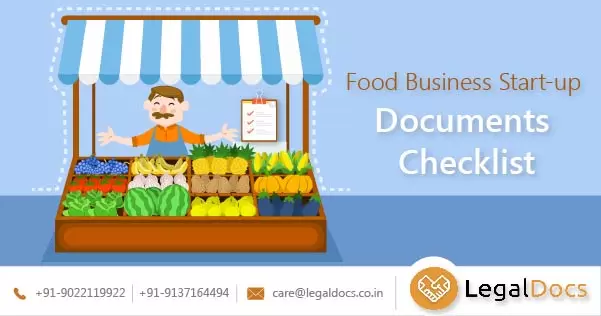Documents Checklist for Food Business Startup
A start-up food business may be in the form of an eating joint, bakery, café, warehouse, food truck, sweet shop, grocery store, homemade food products- jam and pickles, meat products, and dairy products. Manufacturing as well as processing, both are considered a food industry. This means that even a restaurant will come under the ambit of the food industry.
For all entrepreneurs, the food industry is a lucrative one. This is because, no matter what everyone has to eat. Besides, the various challenges that a food industry would face, one really needs to follow a lot of rules and regulations at both Centre and state level. The regulations are stringent because any negligence in a food industry may be fatal for consumers. In some cases, it may also lead to large-scale epidemic. To avoid troubles later, here is some information that one needs to know to make planning for food industry easy, quick, and hassle free:
FSSAI/ Food license: Food Safety and Standards Authority of India is the primary regulatory body to govern the food business in India. It ensures high-quality standards for consumer safety. In general, there are two types of food packaging compliances:
Central License: Largely sized food manufacturers, exporters, head offices with operations in more than one states and certain businesses with annual turnover of more than INR 20 crore. Know more about Eligibility and Process of Central FSSAI License.
State License: For turnover up to INR 20 crore having business within the state boundaries, a food business requires FSSAI State License. This includes all food business operators such as; hotels, restaurants, and medium-sized food manufacturers.
The Food Safety and Standards Authority also efficiently inspects the food industry start-ups to ensure and identify the level of compliance that is set out in the regulation.
2. Packaging and Labelling of food products: There are food packaging compliances that are specified according to the regulations provided for pre-packaged, proprietary, and other specific products. It claims that the food should be packed in a manner such that its contents remain unchanged until its consumption. For this purpose, every food industry starts up must comply with the Food Safety and Standards (Packaging and Labelling) Regulations, 2011.
3. Compliances related to food contamination: Food Safety and Standards (Contaminants, Toxins, and Residues) Regulations, 2011provide FSSAI compliances that have been further extended to provide food quality to avoid food adulteration. Contamination of food at any point in time, before it reaches the consumer is a major issue.
4. Environment and pollution-related clearances: Various clearances required are:
Pollution control: A No Objection Certificate (NOC) has to be obtained from the State Pollution Control Board (SPCB) before the commencement of construction of the food industry. In case, the industry lies in the high-pollution category, a full-fledged Environment Impact Assessment (EIA) is required. It is submitted to SPCB for approval. Only then the construction can begin.
Industries that require water and effluent disposal: NOC from the designated SPCB must be obtained before the commencement of the construction.
Industrial units functioning outside industrial area: This requires permissions from local bodies, including; municipal corporation and panchayats. In case of purchase of private agricultural land, the land has to be rezoned to be recognized as an industrial zone. Such permissions are obtained from the local office of the Directorate of Town & Country Planning.
Registration and licensing of a boiler: The safety clearance of the boilers is required before the commencement of the operations. The Chief Electrical Inspector and Chief Inspector of Boilers will provide clearances related to electrical and pressure vessels (boilers) respectively.
For 100\% export oriented units, additional concessions can only be enjoyed after the clearance is obtained from the Development Commissioner of the Export Processing Zone (EPZ). In case the equity shares are offered to the public to raise funds, one must get the clearance from the Stock Exchange Board of India (SEBI).
5. GST Registration: Under the recently adopted Goods and Service Tax regime, all business with an annual turnover of INR 20 lakh are required to register and pay GST. FSSAI has now decided to reclassify food businesses on the basis of the turnover in order to align with the new GST regime.
6. Land Registration: For setting up agro-processing clusters, land acquisition is difficult. The government provides aids to acquire at least 10 acres of land is required to be arranged either b purchase or on lease for at least 50 years.
7. Fire Department: According to Fire Services Act in the state, one must acquire a NOC from the Chief Fire Officer. For this purpose, one share requires 2 sets of the building plan and a duly filed questionnaire provided by the Fire Department. Also, a model of the building and checklist with certification from the Artichect are mandatory to present here.
8. Health Trade License: Since every state has its own municipality laws, one can apply for this license through local municipality office.
9. ESI: The Employees State Insurance Act, 1848 provides certain benefits to employees. All factories within employees more than 25 members shall provide self-financing social security and health insurance for Indian workers. Medical, sickness, maternity, and disability benefit are provided against any mis-happening that may happen with a worker during the course of work.
10. Electricity meters: Factory built buildings and homes shall meet meters and metering requirements. This includes meter sockets and electrical wiring. Provisions shall be made such that the electrical consumption is minimum and safe. Only commercial units suitable for the electrical load of the industry can be used in a factory.
On one hand, all these compliances are mandatory, there are also schemes available under the Ministry of Food Processing Industries. The schemes aim to provide development of modern infrastructure and common facilities. Agro-processing clusters can receive benefits in enabling basic infrastructure and core infrastructure. Besides this Mega Food Parks have been developed under the Pradhan Mantri Kisan Sampada Yojana. Efforts have been put in place in order to develop skills. While compliances are difficult to follow, these schemes offer respite to food industry start-ups to develop and nurture their growth.
Are you confident and Motivated enough to Start Food Business in India?
Legaldocs will guide you in getting all necessary Food Licensing and Registration required to start your business, Please click on the following link to connect with our consultants.
Apply for Food Business Knowledge Center
Knowledge Center


























LEAVE A REPLY: